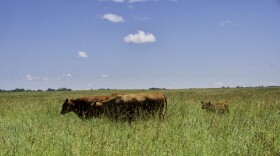-
Industry experts discuss the swift impact of the Trump administration's new policies on the Michigan's agricultural industry, from research funding, to farm staffing, to international trade.
-
Michigan State University laboratories and other labs studying crop resilience and food security across the country are no longer receiving federal funding. They have also been ordered to stop working after the dismantling of USAID by the Trump administration over the past month.
-
First, what stopping USAID funding does to agricultural research at schools like MSU. Then, how a fatal accident changes the emotional value of a camping spot. Later, a new film documenting the impact of the Great Lakes Fishery Commission.
-
Senator Gary Peters has just announced his retirement. Additionally, there is an upcoming debut album from a Michigan alternative rock artist. We also have news about an indigenous Michigan apple that can withstand temperature fluctuations. Lastly, we'll explore the history of Traverse City’s Botanic Garden.
-
Michigan retailers have until December 31st to transition to selling only cage-free eggs. That change is the result of 2019 legislation that banned eggs from birds raised in cages at farms with over 3,000 egg-laying hens.
-
Today, translating campaign rhetoric into real talk about trade and tariffs. Also, the grinding hard work of modern agriculture, and an innovation that might be enough to keep one Michigan family in the game. Plus, an elegant and insightful history about the utopian vision of Detroit’s Shrine of the Black Madonna.
-
Michigan State’s Jason Rowntree is out to prove that ranching is an ecological asset.
-
Experts say labor costs and competition from imports are causing specialty crop growers—including apple and cherry producers—to sell their farms or switch to other crops.
-
What Michigan farmers are up against in the changing climate and growing seasons. Also today, what’s wrong with Michigan’s housing stock. A discussion on a new study of statewide housing needs. Growing interest in native plants. Then, a short history of Gerrymandering in the United States and Michigan lessons about reclaiming representation.
-
The Agricultural Climate Resiliency Program has chosen four projects to fund for its inaugural round, with each getting $1.25 million over three years.
Play Live Radio
Next Up:
0:00
0:00
Available On Air Stations







